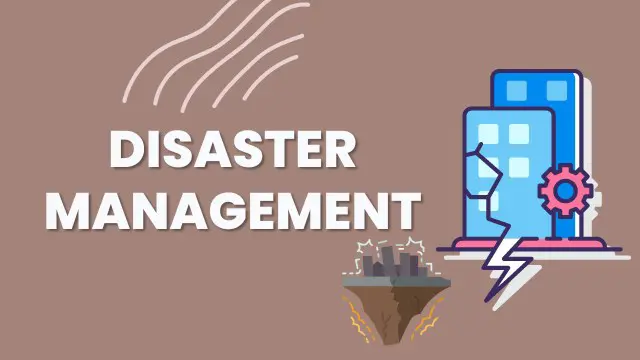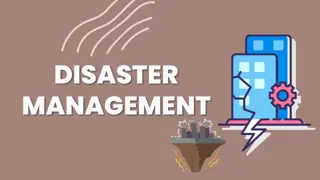
Disaster Management Diploma - CPD
CPD Certified| Free PDF Certificate | Lifetime Access | Learner Support | No Hidden Fees | 100% Success Rate
EDURISE
Summary
- Certificate of completion - Free
- Reed courses certificate of completion - Free
- Tutor is available to students
Add to basket or enquire
Overview
Unlock the Power of Disaster Management with Our Masterclass
Are you ready to take on one of the most critical roles in today's world? Disaster management is an indispensable skill, both for individuals and organizations. As natural and human-made disasters continue to pose threats worldwide, the demand for disaster management expertise is higher than ever before.
Why Disaster Management Matters:
In an unpredictable world, the ability to effectively plan for, respond to, and recover from disasters is a crucial skill set. Whether you're a concerned citizen, a business owner, or a professional, disaster management can make a significant impact:
1. Protect Lives: Learn how to ensure the safety of yourself, your loved ones, and your community in the face of various disasters, from natural catastrophes to public health emergencies.
2. Safeguard Property: Discover strategies to protect your assets and investments, whether you're a homeowner or a business owner.
3. Ensure Business Continuity: Gain insights into keeping your business afloat during and after a disaster, minimizing downtime and ensuring a swift recovery.
4. Community Leadership: Develop leadership skills to take an active role in your community's disaster response and recovery efforts.
5. Professional Growth: For those seeking career growth, disaster management expertise is increasingly valuable in a wide range of sectors, from public safety to healthcare and construction.
What You'll Learn:
Our Disaster Management Masterclass is designed to equip you with the knowledge and skills needed to navigate and mitigate disasters. You'll explore data-driven insights into disaster trends, innovative techniques for preparedness, and effective strategies for response and recovery. Here's a sneak peek of what you can expect:
Module 1: Understanding Disaster Trends: Dive into the data behind disasters – their causes, frequency, and impact – to make informed decisions.
Module 2: Preparedness and Mitigation: Learn how to assess risks and vulnerabilities, develop robust disaster plans, and take steps to minimize the impact of disasters.
Module 3: Effective Response Strategies: Understand the critical aspects of managing a disaster as it unfolds, from immediate response to long-term recovery.
Module 4: Building Resilience: Discover how to bounce back stronger after a disaster, whether you're an individual, a business, or a community.
Module 5: Case Studies and Best Practices: Analyze real-world disaster management success stories and apply these lessons to your unique situation.
Who Should Enroll:
- Concerned Citizens
- Business Owners and Managers
- Emergency Responders
- Healthcare Professionals
- Public Safety Personnel
- Engineers and Architects
- Community Leaders
- Public Health Workers
- And Anyone Who Cares About Being Prepared
Join our Disaster Management Masterclass and take a proactive step toward safeguarding lives, property, and livelihoods. In today's unpredictable world, disaster management is not just a skill – it's a responsibility. Enroll now to make a difference when it matters most.
Free Gift
- Course Completion PDF Certificate
- Tutor Support
- Free Session with professionals
Curriculum
Course media
Description
Learning Outcomes for Chapter 1 – Preparation:
Disaster Awareness: Develop a comprehensive understanding of various disaster types, both natural and human-made, to enhance your preparedness and response capabilities.
Risk Assessment: Acquire the skills needed to assess the risks and vulnerabilities specific to your location or organization, enabling you to make informed decisions in the face of potential disasters.
Emergency Planning: Learn how to create effective emergency plans tailored to different scenarios, ensuring you and your community or organization are ready to respond promptly.
Resource Allocation: Gain insights into the efficient allocation of resources during the preparation phase, ensuring you can maximize the utility of available assets.
Effective Communication: Understand the importance of clear and efficient communication strategies for coordinating actions and responses during a disaster.
Learning Outcomes for Chapter 2 – Making a Disaster Supply Kit:
Essential Supplies: Identify and assemble a comprehensive disaster supply kit with the essential items needed to sustain yourself and your family during emergencies.
Food and Water Management: Learn how to store and manage food and water supplies to ensure they remain safe and adequate for extended periods.
First Aid and Medications: Understand the importance of including first-aid supplies and necessary medications in your kit to address injuries and health concerns.
Customization: Tailor your disaster supply kit to the specific needs and challenges of your geographic location and potential disaster scenarios.
Maintenance and Updates: Develop a strategy for regularly maintaining and updating your kit to keep it current and effective.
Learning Outcomes for Chapter 3 – Emergency Actions:
Response Protocols: Develop a solid grasp of the fundamental protocols and actions to take immediately when a disaster strikes to ensure safety.
Evacuation Planning: Learn how to plan for and execute a safe evacuation if required, considering various factors like routes, shelter options, and transportation.
Shelter and Protection: Understand how to seek shelter, provide protection for yourself and others, and make quick decisions in high-stress situations.
Communication and Alert Systems: Learn about available communication tools and alert systems to stay informed during emergencies and coordinate with relevant authorities.
Community Involvement: Understand the role of community and local organizations in emergency actions, and how to collaborate effectively with them.
Learning Outcomes for Chapter 4 – Types of Disasters and Response Strategies:
Natural Disasters: Gain insight into various natural disasters, such as earthquakes, hurricanes, floods, and wildfires, and learn specific response strategies for each.
Human-Made Disasters: Understand the impact of human-made disasters like industrial accidents, terrorism, and cyberattacks, and how to respond effectively.
Risk Reduction: Learn about strategies for reducing the risk of disasters, such as building resilience and implementing preventative measures.
Community Resilience: Explore the concept of community resilience and how to foster it by engaging with local authorities and organizations.
Adaptive Strategies: Develop adaptive strategies that can be tailored to different disaster scenarios, ensuring a more versatile response.
Learning Outcomes for Chapter 5 – Managing During a Disaster:
Leadership and Decision-Making: Acquire the skills needed to take on leadership roles during a disaster, make critical decisions, and coordinate actions effectively.
Resource Management: Learn how to manage resources efficiently in high-stress situations, ensuring that aid and support reach those in need.
Communication and Information Sharing: Understand the significance of clear and continuous communication during a disaster, as well as the sharing of vital information.
Psychological Support: Gain insights into providing psychological support and assistance to individuals and communities dealing with the emotional aftermath of a disaster.
Recovery Planning: Explore the initial stages of recovery planning and actions, setting the groundwork for rebuilding and restoring affected areas.
Certificate of Completion
After completing the Disaster Management diploma course, you will be able to obtain your free PDF certificate of course completion.
Who is this course for?
Ideal Audience and Traffic for the "Disaster Management Masterclass" based on the Curriculum:
Homeowners and Families: Individuals and families interested in ensuring their safety and preparedness for various disasters, ranging from natural events like hurricanes and wildfires to human-made crises like power outages or civil disturbances.
Community Leaders: Local community leaders, neighborhood associations, or community watch groups looking to enhance their community's disaster preparedness and response capabilities.
Small Business Owners: Small business owners aiming to safeguard their establishments and employees during emergencies and minimize potential downtime.
Non-Profit Organizations: Representatives from non-profit organizations focused on disaster relief and community support, seeking to improve their response strategies.
Educational Institutions: Faculty, staff, and administrators from educational institutions, including schools and universities, who need to develop safety and response plans for students and staff.
First Responders and Emergency Personnel: Professionals working in the field of emergency services, including police, fire, and medical personnel, interested in refining their skills and understanding the broader context of disaster management.
Government Officials: Local and regional government officials and policymakers responsible for disaster preparedness and response planning within their jurisdictions.
Risk Management Professionals: Individuals involved in risk assessment and management, including insurance professionals, who want to gain a comprehensive understanding of disaster scenarios and mitigation.
Environmental and Safety Consultants: Consultants specializing in environmental safety and disaster management, seeking to improve their knowledge and capabilities.
Volunteers and Humanitarian Aid Workers: Volunteers and workers interested in participating in disaster relief efforts and humanitarian aid missions, who wish to enhance their preparedness and response skills.
General Public: Anyone concerned about their personal and community safety and interested in learning how to effectively prepare for and respond to disasters.
Corporate Executives: Business leaders interested in ensuring the resilience of their companies in the face of various crises and minimizing disruptions to operations.
Teachers and Educators: School teachers and educators looking to incorporate disaster preparedness and safety education into their curricula.
Healthcare Professionals: Healthcare workers, including doctors, nurses, and support staff, seeking to ensure their facilities' preparedness during emergencies.
Environmentalists and Conservationists: Individuals and organizations focused on environmental protection and conservation who want to better understand and respond to environmental disasters.
This course offers valuable knowledge and skills for a wide range of audiences, enabling them to better prepare for, respond to, and recover from disasters and emergencies, whether at a personal, community, or organizational level.
Requirements
The Disaster Management course has no formal entry requirements. However, to study the Disaster Management course students must:
Have passion for virtual learning
Have a good understanding of English, as well as numeracy and IT skills
Have a desire for Disaster Management topic
Be over the age of 16
Career path
Disaster Management Coordinator: With expertise from the Disaster Management Masterclass, pursue a career in coordinating disaster relief efforts, potentially earning a UK salary ranging from £25,000 to £40,000.
Disaster Response Specialist: Become a recognized expert in disaster management, unlocking a world of opportunities with the potential to earn a competitive UK salary exceeding £50,000 .
Questions and answers
Currently there are no Q&As for this course. Be the first to ask a question.
Certificates
Certificate of completion
Digital certificate - Included
Reed courses certificate of completion
Digital certificate - Included
Will be downloadable when all lectures have been completed
Reviews
Currently there are no reviews for this course. Be the first to leave a review.
Legal information
This course is advertised on reed.co.uk by the Course Provider, whose terms and conditions apply. Purchases are made directly from the Course Provider, and as such, content and materials are supplied by the Course Provider directly. Reed is acting as agent and not reseller in relation to this course. Reed's only responsibility is to facilitate your payment for the course. It is your responsibility to review and agree to the Course Provider's terms and conditions and satisfy yourself as to the suitability of the course you intend to purchase. Reed will not have any responsibility for the content of the course and/or associated materials.


